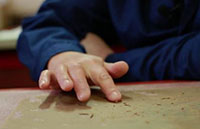Chinese Go master loses battle with pancreatic cancer
By WANG KAIHAO (China Daily) Updated: 2012-11-03 01:05Chen Zude, a master of Chinese Go (or weiqi, a kind of ancient Chinese chess) died on Thursday night at Peking Union Medical College Hospital in Beijing after battling pancreatic cancer. He was 68.
Chen, born in Shanghai, began to learn the game at the age of 7. He was among the first professional Go players after the founding of the People’s Republic of China in 1949. Chen won three national championship titles in 1962, 1964 and 1974 and was the leading player of his generation.
On Sept 27, 1963, Chen defeated Masao Sugiuchi of Japan, who had the highest Go ranking of 9 dan, to become the first Chinese to beat that nation’s highest-ranked player. He later created Chinese fuseki, a Go opening pattern that has hugely influenced top players in China and Japan.
Chen was diagnosed with gastric cancer in 1980 but recovered after a long struggle. He was awarded 9 dan in 1982 and wrote his autobiography, Go Beyond Yourself, which won him the People’s Literature Award, one of the country’s most important literary awards, in 1994.
Chen was the first president of China Qiyuan, the nation’s official agency responsible for board games and card games, from 1992 to 2003 and launched the Chinese professional Go league. He later made frequent appearances in competitions, playing his last professional game on Dec 21, 2010.
Numerous Go players from China and overseas expressed their condolences online shortly after Chen’s death.
“He started in a barren land of old times,” Li Zhe, a player with the Chinese Go national team, wrote on his Sina Weibo micro-blogging site, using classical Chinese language. “He inherited the cream of this national art. He constructed the big house of Chinese Go.”
South Korea’s top Go player, Lee Sedol, wrote on Facebook: “He was a predecessor I greatly respect. I feel very sad but I believe he has gone to a better place.”
Lee visited Chen after Lee competed in Beijing in August when Chen gave him a set of chess manuals.
wangkaihao@chinadaily.com.cn
- China renews blue alert for rainstorm
- IMF: Economic restructuring 'desirable'
- Doctor severely wounded by ex-patient
- Speedier delivery to aid transplants
- 118 flights delayed by storms in Guangzhou
- Taiwan's participation in WHA based on One China principle
- Beijing's five-year plan: Cut population, boost infrastructure
- Inspection teams to cover all of military
- Disney promises 'safe, pleasing service of high quality'
- Palace Museum discovers relics buried for over 600 years








